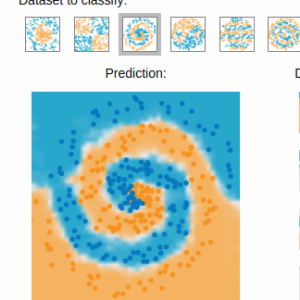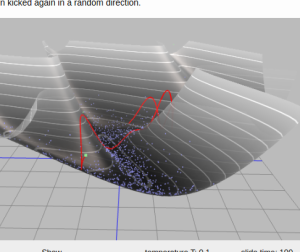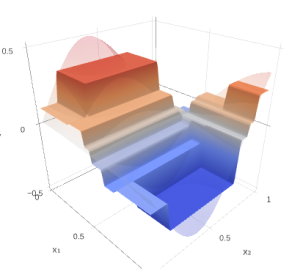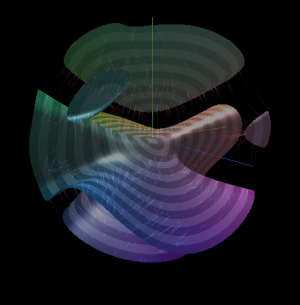Log-likelihood benchmark
Log-likelihood benchmark¶
This is a simple benchmark, which I use for basic test of vector-based computing engines.
The problem is to find log-likelihood of normal distribution: $\sum_i \log \left[ \dfrac{1}{\sqrt{2 \pi \sigma}} \exp \left( - \dfrac{(x_i - x)^2}{2 \sigma^2} \right) \right] $
There are elementwise subtraction, division, power, exponent, logarithm and summation of array, so this is broader test.
tested:
- numpy + scipy's pdf
- numpy
- cython
- numexpr
- theano
- parakeet
- C++
- FORTRAN
computing log-likelihood for normal distribution
Notes
- Not optimizing computations here (but in theory theano and parakeet may remove unnecessary computations)
- This test includes exp, log, division and summation of array
- Everything is running on CPU in one thread, this limitation is for 'fairness' of tests
import numpy
import scipy
from scipy.stats import norm
import theano
Scipy implementation¶
def llh_scipy(data, mean, sigma):
lh = norm(mean, sigma).pdf(data)
return numpy.log(lh).sum()
Numpy implementation¶
def llh_numpy(data, mean, sigma):
s = (data - mean) ** 2 / (2 * (sigma ** 2))
pdfs = numpy.exp(- s)
pdfs /= numpy.sqrt(2 * numpy.pi) * sigma
return numpy.log(pdfs).sum()
Cython implementation¶
%load_ext Cython
%%cython
cdef extern from "math.h":
double sqrt(double m)
double exp(double m)
double log(double m)
import cython
import numpy as np
cimport numpy as np
from numpy cimport ndarray
pi = np.pi
@cython.boundscheck(False)
@cython.wraparound(False)
def llh_cython(ndarray[np.float64_t, ndim=1] data, double mean, double sigma):
cdef int l = len(data)
cdef double llh = 0
cdef double s = 0
for i in xrange(l):
s = (data[i] - mean) ** 2 / (2 * (sigma ** 2))
llh += log(exp(-s) / (sqrt(2 * pi) * sigma))
return llh
Numexpr implementation¶
import numexpr
numexpr.set_num_threads(1)
def llh_numexpr(data, mean, sigma):
expression = 'sum(log(exp(- (data-mean) **2 / (2 * sigma ** 2)) / (sqrt(2 * pi) * sigma)))'
return numexpr.evaluate(expression, local_dict=dict(data=data, mean=mean, sigma=sigma, pi=numpy.pi))
Parakeet implementation¶
import parakeet
parakeet.config.backend = 'c'
@parakeet.jit
def llh_parakeet(data, mean, sigma):
s = (data - mean) ** 2 / (2 * (sigma ** 2))
pdfs = numpy.exp(- s)
pdfs /= numpy.sqrt(2 * numpy.pi) * sigma
return numpy.log(pdfs).sum()
Theano implementation¶
import theano
import theano.tensor as T
print theano.config.device
theano.config.openmp
def llh_theano(data, mean, sigma):
s = (data - mean) ** 2 / (2 * (sigma ** 2))
pdfs = T.exp(- s)
pdfs /= T.sqrt(2 * numpy.pi) * sigma
return T.log(pdfs).sum()
mean, sigma = T.scalars('m', 's')
d = T.vector('data')
llh_theano = theano.function([d, mean, sigma], llh_theano(d, mean, sigma))
FORTRAN implementation¶
%load_ext fortranmagic
%%fortran
subroutine llh_fortran(data, mean, sigma, result)
real*8, dimension(:), intent(in) :: data
real*8, intent(in) :: mean, sigma
real*8, intent(out) :: result
real*8, dimension(size(data, 1)) :: s
real*8, parameter :: PI = 3.14159265358979323846
s = (data - mean) ** 2 / (2 * sigma ** 2)
s = exp(- s) / (sqrt(2 * PI) * sigma)
result = sum(log(s))
end subroutine llh_fortran
C++ implementation for comparison of speed¶
we are neither passing, nor returning anything in c++. Just doing same operations in C++ for some array to compare speed.
Mind the overhead for creating new process - it is essential for small sizes.
%%writefile test_speed.cpp
#include <iostream>
#include <stdio.h>
#include <stdlib.h>
#include <math.h>
// using namespace std;
int main(int argc, char** argv) {
if (argc < 4){
std::cout << "run with n_samples, mean, sigma!";
return 1;
}
int size = atoi(argv[1]);
double mean = atof(argv[2]);
double sigma = atof(argv[3]);
double * data = new double[size];
double factor = 1. / size;
for (int i=0; i<size; ++i){
data[i] = i * factor;
}
double result = 0.;
double s = 0.;
double x = 0.;
for (int i=0; i<size; ++i){
x = (data[i] - mean);
s = x * x / (2 * (sigma * sigma));
result += log(exp(-s) / (sqrt(2 * M_PI) * sigma));
}
std::cout << std::endl << result << std::endl;
return 0;
}
!g++ test_speed.cpp -o test_speed -O3
def llh_cpp(data, mean, sigma):
size = len(data)
out = !./test_speed {len(data)} {mean} {sigma}
Data generation, checking that all functions output the same value¶
from collections import OrderedDict
functions = OrderedDict()
functions['scipy'] = llh_scipy
functions['numpy'] = llh_numpy
functions['cython'] = llh_cython
functions['numexpr'] = llh_numexpr
functions['parakeet'] = llh_parakeet
functions['theano'] = llh_theano
functions['fortran'] = llh_fortran
functions['c++'] = llh_cpp
data = numpy.random.normal(size=1000000).astype('float64')
for name, function in functions.items():
print name, function(data, 0.1, 1.1)
import timeit
sizes = [10 ** 5, 10 ** 6, 10 ** 7, 10 ** 8]
import pandas
scores = pandas.DataFrame(data=0, columns=functions.keys(), index=sizes)
for size in sizes:
for name, function in functions.items():
data = numpy.random.normal(size=size).astype('float64')
result = %timeit -o function(data, 0.1, 1.1)
scores.loc[size, name] = result.best
Results (time in seconds, less is better)¶
scores
Comparison to numpy time (less is better)¶
normalized_scores = scores.copy()
for column in normalized_scores.columns:
normalized_scores[column] /= scores['numpy']
normalized_scores
Conclusion¶
Many libraries claim that they can speed up number crunching in python. Results of this test are floating (+- 0.1), but what we can see
- numpy turned out to be fastest at moderate sizes of arrays
- numpy implementation at least not more complex than others
- parakeet was the only to get sensible speed up
Technical info¶
import multiprocessing
print multiprocessing.cpu_count(), 'xeon cores'
numpy.__version__
scipy.__version__
import cython
cython.__version__
numexpr.__version__
parakeet.__version__
theano.__version__
!g++ -v
!gfortran -v
This post was written in IPython. You can download the notebook from repository.
 Gradient boosting
Gradient boosting  Hamiltonian MC
Hamiltonian MC  Gradient boosting
Gradient boosting  Reconstructing pictures
Reconstructing pictures  Neural Networks
Neural Networks